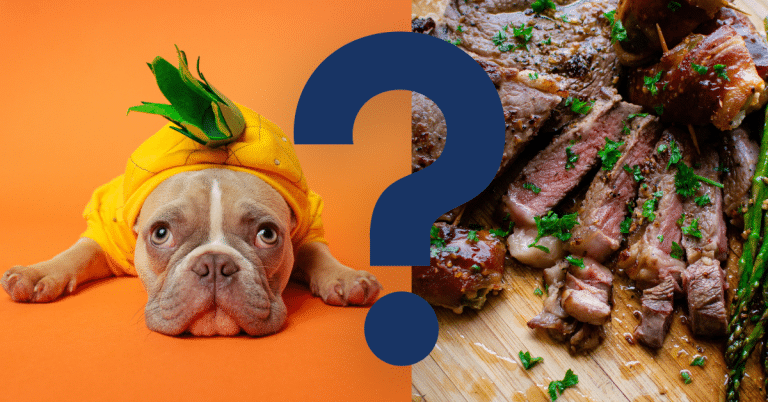Can Dogs Eat Burgers? A Vet’s Opinion

Burgers are usually high in fat and calories but can dogs eat burgers?
Dogs may normally consume plain, cooked beef or turkey burgers devoid of condiments, spices, onions, garlic, or additives. Onions and garlic, which can be poisonous to dogs, should not be used in burgers. Burgers with a lot of seasoning or heat should also be avoided since they irritate a dog’s tummy.
Let’s dive in:
Benefits Of burger for dogs
Dogs can consume burgers in moderation, but they are not normally included in their regular diet, and there are no health advantages to giving burgers to dogs. There are a few potential advantages in specific situations, though:
- High-Quality Protein: Lean meats like beef or turkey, which are used to make burgers, offer high-quality protein, which is crucial for the general health, muscular growth, and energy of your dog.
- Diversity: Providing your dog with the odd hamburger can add to their diet’s diversity and may be a pleasant difference from the dog food they often receive. In their diet, variety can assist in preventing boredom.
- For your dog’s occasional indulgence or as a special treat or incentive during training, use a little slice of a plain, cooked burger.
- Encourage Eating: In certain circumstances, a little quantity of plain burgers may help a dog who is a finicky eater or is recuperating from an illness or surgery to eat more of their usual dog food.
It’s critical to stress that “moderation” is the essential word here. Overfeeding your dog on hamburgers can result in obesity, intestinal problems, and an unbalanced diet. Serving basic, cooked beef without any potentially dangerous additions is essential since several burger components, including onions, garlic, cheese, and high-fat content, can be toxic to dogs.
Before adding new foods to your dog’s diet, always check with your veterinarian to be sure they meet their individual nutritional needs and address any potential health issues. The best approach to ensure that your dog is getting all the vital nutrients they require for optimum health is usually to feed them balanced professionally prepared dog food.

How To Safely Give Burgers To dogs
If you want to treat your dog to burgers without risking their health, go by following instructions:
- Pick a simple, Cooked, Lean Meat Burger Patty: opt for a simple, cooked, lean turkey or beef burger patty. Burgers containing herbs, onions, garlic, or spices should be avoided since they might be toxic to dogs.
- Cook Burger Thoroughly: To reduce the risk of foodborne diseases, make sure the burger is well-done. While cooking, avoid adding any spices, salt, or seasonings.
- Cut Into Bite-Sized Pieces: Slice the hamburger patty into thin, bite-sized pieces. This reduces the possibility of choking and makes it simpler for your dog to eat.
- Remove The Bread And Toppings: When feeding a burger to your dog, remove the bread, cheese, and any toppings like ketchup or mayonnaise. These products can include substances that are harmful to dogs and could cause stomach distress.
- Serve Burgers Moderately: Keep in mind that burgers are treats and should not constitute a large component of your dog’s diet. As an occasional treat, a little serving, roughly equal to a few nibbles, is adequate.
- Watch Your Dog: While your dog is eating the burger, keep an eye on them. Some dogs may eat their food rapidly, which might cause gastrointestinal issues or choking risks. Make sure they securely eat and digest the burger.
- Following the feeding of your dog a hamburger, keep an eye out for any negative responses. Vomiting, diarrhea, and odd behavior are all potential indicators of a food allergy or intolerance. Contact your veterinarian if you experience any unfavorable symptoms.
- Balance With Normal Diet: Ensure that your dog’s normal, balanced dog food is given in addition to the hamburger reward. It shouldn’t take the place of their main nourishment supply.
- Think About Your Dog’s Health: When determining whether to offer your dog a burger, consider their age, size, and any health issues or nutritional needs. If you have any questions, speak with your veterinarian right away.
- Avoid Giving Your Dog High-Fat Burgers: Don’t feed your dog high-fat burgers since they might cause digestive issues and the dangerous ailment pancreatitis.
Keep in mind that not all dogs can tolerate human food equally, and some may be allergic or sensitive to substances. It’s recommended to speak with your veterinarian for advice relevant to your dog’s requirements if you ever have questions about whether it’s safe to feed your dog a certain food.
Will Burgers Make A Dog Sick?
In moderation, dogs may normally eat plain, well-cooked burgers made from lean meats like beef or turkey. Burgers may, however, make a dog ill if certain circumstances are not met:
- Burgers containing seasonings or additions, such as onions, garlic, or spices, might be hazardous to dogs or disrupt their digestive systems. Avoiding these components is advised.
- High Fat Content: Dogs who receive huge amounts of high-fat hamburgers may develop pancreatitis. Inflammation of the pancreas is a painful and perhaps fatal illness known as pancreatitis.
- Uncooked Meat: Giving your dog undercooked or raw hamburger meat puts them at risk for contracting foodborne infections like salmonella or E. coli, which may be harmful to people and dogs alike.
- Portion Size: Feeding your dog too much burger meat or doing so too regularly might cause digestive problems, obesity, or a diet that is unbalanced.
- Bun And Toppings: Dogs should not eat hamburger buns, cheese, or sauces like ketchup or mayonnaise. Ingredients that are hazardous or hard for dogs to digest may be present.
- Large bits of meat or hamburger might be a choking hazard, particularly for smaller dog breeds. Make sure the burger is divided into reasonable portions.
- Food Allergies Or Sensitivities: Certain burger components, including beef or turkey, may cause allergies or sensitivities in some dogs. Know the precise dietary requirements and any known allergies for your dog.
It’s essential to give your dog a simple, cooked, and well-prepared burger meat without any dangerous additions to reduce the chance of your dog getting ill. Burgers should never be a regular component of your dog’s diet; they should only be given sometimes as a treat. For personalized guidance based on your dog’s health and nutritional needs, speak with your veterinarian if you have any questions or concerns about whether burgers are acceptable for your dog.

A Vet’s Summary
The basic recommendations for feeding human food to dogs are likely to be in accord with a veterinarian’s judgement on whether to give burgers to dogs. Here are some essential ideas that doctors frequently stress:
Moderation is usually advised by veterinarians when it comes to feeding dogs human food, especially hamburgers. Although basic, cooked meat may be a secure treat, a dog’s diet shouldn’t contain a lot of it.
Quality Ingredients: When feeding burgers to dogs, veterinarians emphasize the need of using high-quality, plain, cooked beef without additions, condiments, onions, garlic, or spices.
Veterinarians warn against giving dogs too big servings of hamburgers since doing so might cause obesity and other health problems.
- Consider your dog’s particular digestive tolerance when determining digestibility. Some dogs can have sensitive tummies or dietary allergies that make some burger components difficult for them to consume.
- Avoiding High Fat And Extras: According to veterinarians, feeding dogs high-fat hamburgers might cause pancreatitis. Additionally, since they could have elements that might be detrimental to dogs, burger bread, cheese, and sauces should be avoided.
- Regular Diet: Dogs should not be fed hamburgers in place of their regularly scheduled, nutritionally balanced dog food. They should be regarded as treats because they are.
- Consultation: It is recommended to speak with your veterinarian if you have any concerns or queries regarding feeding burgers to your dog. They can offer suggestions that are based on the individual health, age, and nutritional requirements of your dog.
Dogs may consume probiotics, and in some circumstances, they may be good for their health. Probiotics are living microorganisms that are good for the digestive system. They are generally bacteria or yeast. Due to their role in preserving a balanced population of gut flora, they are occasionally referred to as “friendly” or “good” bacteria.
In conclusion, even if some vets might agree that dogs can occasionally enjoy basic, well-cooked meat from burgers without harm, they usually stress the significance of responsible and considerate feeding habits to protect your pet’s health and wellbeing. It is always a good idea to consult with your veterinarian before introducing new items into your dog’s diet since they may offer individualized guidance based on the circumstances of your dog.
Videos To Watch
If you are wondering whether dogs can eat burger, watch this:
If you are wondering whether burgers are good for dogs, watch this:






